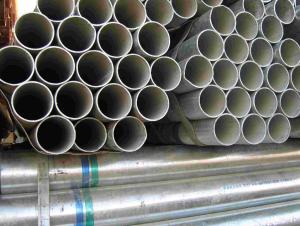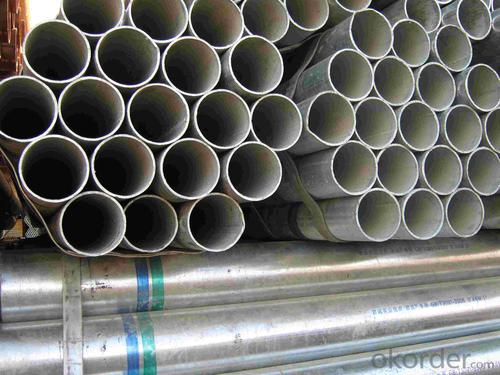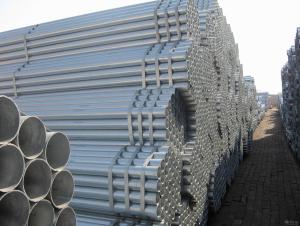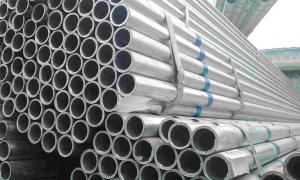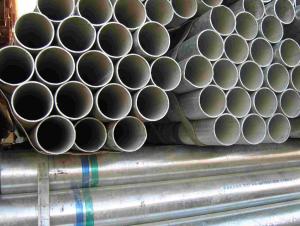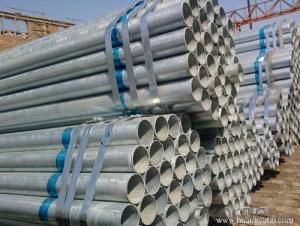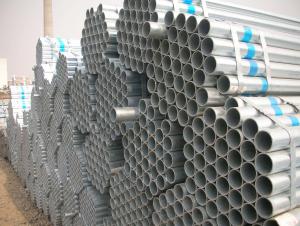Pre-galvanized Galvanized Pipe America Standard A53 Q195 100g
- Loading Port:
- Tianjin
- Payment Terms:
- TT or LC
- Min Order Qty:
- 45 m.t.
- Supply Capability:
- 7000 m.t./month
OKorder Service Pledge
OKorder Financial Service
You Might Also Like
1、Structure of Pre-galvanized Galvanized Pipe America Standard A53 Q195 100g Hot Dipped or Pre-galvanized Pipe:
The surface of Pre-galvanized Galvanized Pipe America Standard A53 Q195 100g Hot Dipped or Pre-galvanized Pipecan increase the corrosion resistance of the steel tube, prolong service life. Galvanized pipe is widely used, in addition to water, gas, oil and other general low pressure fluid pipelines. It is also used in the petroleum industry, especially for offshore oil field of oil well pipe and oil pipe, chemical, coking equipment of oil heater, condensation cooler, coal run oil exchanger tube, and trestle pile, the mine tunnel support frame tube.
2、Main Features of Pre-galvanized Galvanized Pipe America Standard A53 Q195 100g Hot Dipped or Pre-galvanized Pipe:
• High manufacturing accuracy with standard
• High strength and stable
• Good visual effect
• Reasonable price
• Small inertia resistance
• Strong heat dissipation ability
3、Pre-galvanized Galvanized Pipe America Standard A53 Q195 100g Hot Dipped or Pre-galvanized Pipe Specification:
Standard | GB, DIN, ASTM ASTM A106-2006, ASTM A53-2007 |
Grade | 10#-45#, 16Mn 10#, 20#, 45#, 16Mn |
Thickness | 1 - 33 mm |
Section Shape | Round |
Outer Diameter | 21 - 610mm |
Place of Origin | Tianjin, China (Mainland) |
Secondary Or Not | Non-secondary |
Application | Hydraulic Pipe |
Technique | Cold Drawn |
Certification | API |
Surface Treatment | factory state or painted black |
Special Pipe | API Pipe |
Alloy Or Not | Non-alloy |
Length | 5-12M |
Outer Diameter | 21.3-610mm |
Grade | 20#, 45#, Q345, API J55, API K55, API L80, API N80, API P110, A53B |
Standard | ASME, ASTM |
1) Material:20#(ASTM A 106/A53 GRB.API5LGRB,GB),45#,16Mn,10#.
2) Specification range:OD:21.3-610mm,WT:6-70mm,length:6-12m or according to the requirement of clients.
3) Excutive standards:GB,ASME API5L.ASTM A 106/A53,Despite of the above standards,we can also supply seamless steel pipe with standard of DIN,JIS,and so on,and also develop new products according to the requirements of our clients!
4) Surface:black lacquered,varnish coating or galvanized.
5) Ends:Beveled or square cut,plastic capped,painted.
6) Packing:bundles wrapped with strong steel strip,seaworthy packing.
4、Packaging & Delivery
Packaging Details: | seaworthy package,bundles wrapped with strong steel strip |
Delivery Detail: | 15-30days after received 30%TT |
5、FAQ of Pre-galvanized Galvanized Pipe America Standard A53 Q195 100g Hot Dipped or Pre-galvanized Pipe:
②How about price?
Yes, we are factory and be able to give you lowest price below market one, and we have a policy that “ for saving time and absolutely honest business attitude, we quote as lowest as possible for any customer, and discount can be given according to quantity”,if you like bargain and factory price is not low enough as you think, just don’t waste your time.Please trust the quotation we would give you, it is professional one.
③Why should you chose us?
Chose happens because of quality, then price, We can give you both.Additionally, we can also offer professional products inquiry, products knowledge train(for agents), smooth goods delivery, exellent customer solution proposals.Our service formula: good quality+good price+good service=customer’s trust
SGS test is available, customer inspection before shipping is welcome, third party inspection is no problem.
6、 Pre-galvanized Galvanized Pipe America Standard A53 Q195 100g Hot Dipped or Pre-galvanized Pipe: Images:
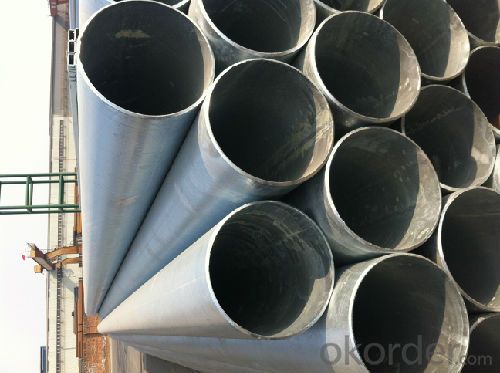
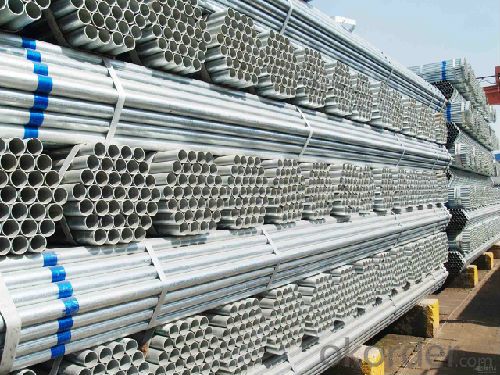
- Q: How do steel pipes handle ground settlement?
- Steel pipes are generally robust and durable, making them well-suited for handling ground settlement. The flexibility and strength of steel allow the pipes to withstand the shifting and settling of the ground without significant damage. Steel pipes have a high resistance to deformation, which means they can maintain their shape and structural integrity even when the ground settles or moves. When the ground settles, steel pipes can accommodate the movement by flexing and bending slightly. This flexibility allows them to adjust to changes in the ground without breaking or cracking. Additionally, steel pipes are often designed with joints that can absorb and distribute stress caused by ground settlement. Furthermore, steel pipes have a smooth interior surface that minimizes friction and resistance to the flow of materials. This feature is particularly important when the ground settles because it reduces the likelihood of clogs or blockages due to debris or sediment settling in the pipes. In summary, steel pipes are well-equipped to handle ground settlement due to their strength, flexibility, and resistance to deformation. They can adapt to the movement of the ground without compromising their structural integrity, making them a reliable choice for various applications, including underground infrastructure and pipeline systems.
- Q: Can steel pipes be used in earthquake-prone areas?
- Indeed, in areas prone to earthquakes, steel pipes have the potential to be employed. Steel, as a durable and sturdy material, possesses the capacity to endure the forces generated during an earthquake. The malleability and pliability of steel facilitate the absorption and dissipation of seismic wave energy, thereby decreasing the likelihood of structural failure. Furthermore, the ability to weld steel pipes enables the construction of resilient and earthquake-resistant edifices. Nevertheless, it is crucial to adhere to appropriate engineering and construction practices to guarantee the proper installation and connection of steel pipes, thereby maximizing their capacity to withstand earthquakes. Additionally, it is imperative to consider local building codes and regulations to ensure compliance and safety in earthquake-prone regions.
- Q: What is the average lifespan of a steel pipe?
- The average lifespan of a steel pipe can vary depending on various factors such as the quality of the steel, the environment it is exposed to, and the level of maintenance. However, with proper installation and maintenance, a steel pipe can typically last anywhere from 20 to 100 years.
- Q: How are steel pipes measured?
- Steel pipes are typically measured by their outer diameter (OD) and wall thickness. The OD is measured using a caliper or tape measure, while the wall thickness is determined using specialized tools like ultrasonic gauges or micrometers. These measurements are crucial for determining the pipe's size, strength, and suitability for various applications.
- Q: How do steel pipes handle extreme weather conditions?
- Steel pipes are highly durable and can withstand extreme weather conditions. They have excellent resistance to corrosion, making them suitable for humid and coastal areas. Additionally, steel pipes can withstand high temperatures, making them reliable in extreme heat or cold. Their strength and resilience make them ideal for various applications, including oil and gas pipelines, water supply systems, and construction projects in harsh weather environments.
- Q: Can steel pipes be used for transporting drinking water?
- Yes, steel pipes can be used for transporting drinking water. Steel pipes are commonly used in water distribution systems and have been used for many years. They are known for their durability, strength, and resistance to corrosion. However, it is important to ensure that the steel pipes used for transporting drinking water are properly coated or lined to prevent any potential contamination from the metal. Additionally, regular inspections and maintenance should be carried out to ensure the integrity of the pipes and to prevent any leaks or breaks that could compromise the quality of the water.
- Q: What are the quality control measures for steel pipe manufacturing?
- The quality control measures for steel pipe manufacturing typically include various stages of inspection and testing, starting from raw material evaluation to the final product. These measures may include checking the chemical composition and mechanical properties of the steel, conducting non-destructive testing such as ultrasonic or magnetic particle inspection, monitoring the dimensions and surface finish of the pipes, and ensuring compliance with relevant industry standards and specifications. Additionally, quality control measures may involve regular maintenance and calibration of equipment, rigorous documentation and traceability of processes, and continuous monitoring and improvement of manufacturing techniques to meet the desired quality standards.
- Q: What are the different types of pipe coatings used for corrosion protection?
- There are several different types of pipe coatings used for corrosion protection. These coatings are applied to the exterior surface of pipes to prevent or delay corrosion, ensuring the longevity and integrity of the pipes. Some of the commonly used pipe coatings for corrosion protection include: 1. Fusion-Bonded Epoxy (FBE) Coatings: FBE coatings are widely used for corrosion protection due to their excellent adhesion and resistance to chemicals, moisture, and abrasion. These coatings are applied by heating the pipe and spraying it with epoxy powder, which then melts and forms a protective layer upon cooling. 2. Polyethylene (PE) Coatings: PE coatings are known for their flexibility and resistance to impact and chemicals. These coatings are typically applied by extrusion or wrapping methods and provide excellent resistance against water, soil, and other corrosive substances. 3. Polyurethane (PU) Coatings: PU coatings offer good resistance to chemicals, moisture, and mechanical damage. They are commonly used for underground pipelines and are applied by spraying or brush coating methods. 4. Coal-Tar Enamel Coatings: Coal-tar enamel coatings are suitable for protecting pipes exposed to highly corrosive environments such as marine conditions or underground applications. They are typically applied by hot or cold wrapping methods and provide excellent resistance to water, acids, and alkalis. 5. Metallic Coatings: Metallic coatings such as zinc, aluminum, or zinc-aluminum alloys are often used as sacrificial coatings to protect the underlying steel pipes. These coatings corrode preferentially, sacrificing themselves to protect the pipe from corrosion. 6. Asphalt Coatings: Asphalt coatings provide a robust barrier against moisture, chemicals, and soil. They are typically applied by hot or cold wrapping methods and are commonly used for underground pipelines. It is important to consider factors such as the specific environment, temperature, and expected lifespan of the pipes when selecting the appropriate type of pipe coating for corrosion protection.
- Q: How are steel pipes used in the water supply system?
- Steel pipes are commonly used in the water supply system due to their durability, strength, and corrosion resistance. They are used to transport water from water treatment plants to homes, buildings, and industries. Steel pipes are also used for underground water mains, as they can withstand high pressures and are less likely to leak or break. Additionally, steel pipes are often used in water storage tanks and pumping stations to ensure a reliable and efficient water supply.
- Q: How are steel pipes protected against rust?
- Steel pipes are protected against rust through various methods such as galvanization, epoxy coating, and using corrosion-resistant alloys.
Send your message to us
Pre-galvanized Galvanized Pipe America Standard A53 Q195 100g
- Loading Port:
- Tianjin
- Payment Terms:
- TT or LC
- Min Order Qty:
- 45 m.t.
- Supply Capability:
- 7000 m.t./month
OKorder Service Pledge
OKorder Financial Service
Similar products
Hot products
Hot Searches
Related keywords
